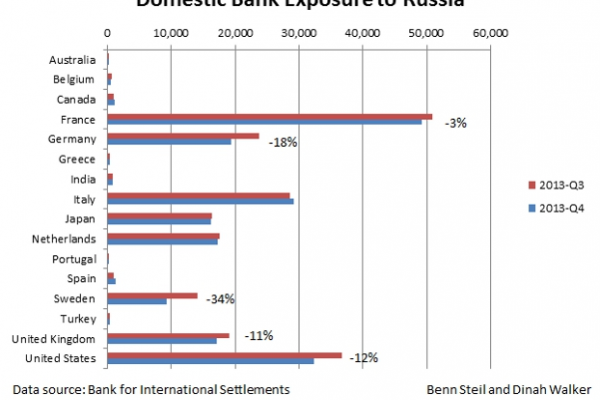While everyone is by now fully aware just how dependent Europe is on Russia’s energy suppliesÂ
(and most are aware of the “nonsense” that the US will fill any gap if Russia steps up its actions – which Barroso said wouldn’t happen because “Russia has self-interest not to play the energy card”) but few are truly aware of the scale of contagious debt-driven defaults that could occur if the US (and a reluctant Europe) decide to undertake more aggressive economic sanctions, which, as Germany’s Europe minister stated today, “are on the table.” As the following chart of Europe’s domestic bank exposure to Russia show, Roth’s warning that Russia’s retaliation could mean “anything is possible,” is a major problem for the Germans, Italians, and most of all – The French.
Germany is nervous…
- *ECONOMIC SANCTIONS `ON THE TABLE’; RUSSIA COULD RETALIATE: ROTH
- *GERMANY’S ROTH SAYS `ANYTHING IS POSSIBLE’ IN UKRAINE CRISIS
Because they know what happens if this house of cards falls down…
As The Council for Foreign Relations notes, in the fourth quarter of last year, with tensions rising between Russia and the West over Ukraine, U.S., German, UK, and Swedish banks aggressively dialed down their credit exposures in Russia… but levels remain huge…
But as the graphic above shows, French banks, which have by far the highest exposures to Russia, barely touched theirs.  At $50 billion, this exposure is not far off the $70 billion exposure they had to Greece in 2010. At that time, they took advantage of the European Central Bank’s generous Securities Market Programme (SMP) to fob off Greek bonds, effectively mutualizing their Greek exposures across the Eurozone. No such program will be available for Russian debt.Â
And much of France’s Russia exposure is illiquid, such as Société Générale’s ownership of Rosbank, Russia’s 9th largest bank by net-asset value ($22 billion).
With the Obama Administration and the European Union threatening to dial up sanctions on Russia, is it time for U.S. money market funds and others to start worrying about their French bank exposures?


